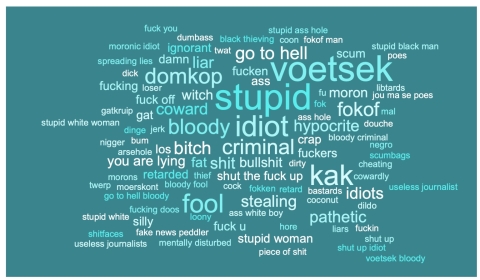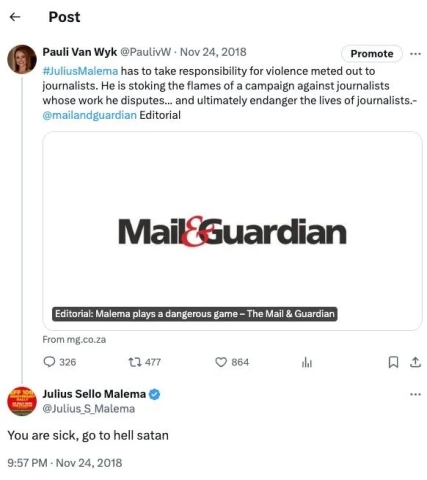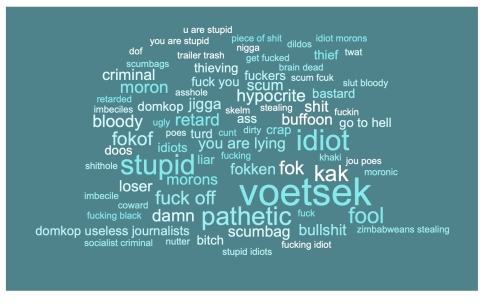This article was originally published in The Daily Maverick.
Political actors and partisan media outlets have been fomenting online violence against prominent Daily Maverick journalists, according to a study published on Wednesday by the US-based International Center for Journalists (ICFJ). The study covers a period from 2012 to the present and includes recent analysis of over 270,000 social media posts.
Prolific gendered disinformation, homophobic abuse, racist hate speech, and threats of extreme sexual violence characterise the online violence experienced by veteran South African journalists Ferial Haffajee, Pauli van Wyk, and Rebecca Davis, according to our Big Data Case study[1], The women journalists of South Africa’s Daily Maverick: — Sexualised, Silenced and Labelled ‘Satan’, published today by ICFJ.
Read the full Report here.
Haffajee, Van Wyk and Davis’ experiences of online violence are emblematic of attacks on South African women journalists, the key perpetrators are political actors, and the modes of abuse reflect the digital misogyny playbook used internationally by authoritarians.
For Pauli Van Wyk, this has involved threats of having her throat slit, being raped, being necklaced, and “shot in the pussy”. She has endured demonisation by EFF party leader, Julius Malema, who called her “Satan” on Twitter(X) in 2018, and torrents of abuse from EFF supporters.

A word cloud of most frequently-used abusive terms targeted at van Wyk.

Ferial Haffajee was the first South African woman journalist to have been targeted in a coordinated gendered disinformation campaign which saw her falsely accused of corruption, collusion, and promiscuity in connection with her reportage on State Capture.
And in Rebecca Davis’ case, she was routinely abused at the intersection of misogyny and homophobia. She told us that a Twitter user once called her a “rug munching cunt with a wasted Oxford education”. Is it any wonder she stopped posting on the platform in 2018? Regardless, she says that particular abusive comment will likely stay with her until she dies.

A word cloud showing the most frequent abusive terms found in the dataset of tweets aimed at Haffajee, including retweets.
In all three cases, we see a pattern of online violence perpetrators inverting the truth and falsely accusing the targets of being disinformation purveyors. Their clear aim? To smear the journalists, discredit their journalism, and undercut public trust in facts.
What does our dataset tell us?
The study as a whole covers the period 2012 to 2024. With computational linguists from the University of Sheffield and data scientists from The Nerve — the digital forensics lab founded by Nobel Laureate Maria Ressa — we analysed 271,000 tweets directed at Haffajee and van Wyk between 1 January 2021 and 1 March 2022.
Our key findings include:
- Approximately 46% of the abuse directed at van Wyk and 40% towards Haffajee appears to be explicitly designed to discredit them professionally.
- Of the abuse targeted at Ferial Haffajee, the highest percentage (24%) was in response to criticism about alleged corruption involving the ANC and EFF.
- Over half (56%) of the catalysts for abuse towards van Wyk can be classified within thematic clusters of ‘corruption’ and ‘politics and government’, with the majority of abusive tweets concerning the VBS Mutual Bank scandal, which was extensively reported by van Wyk.
- Reputational attacks are correlated with reporting on illegal conduct while general abusive remarks are mostly triggered by posts connected to reporting critical of the State.
- The less the women journalists of the Daily Maverick journalists posted on Twitter, the lower the rates of abuse became. This highlights the chilling effect of gendered online violence which is designed to mute the freedom of expression and visibility of women journalists.
- In instances where a woman journalist is not present or active on Twitter, abusers resort to alternative means and platforms to target her. They also still publish abusive and threatening comments about her on the platform in her absence.
- Tweets sent by Pauli van Wyk were more than twice as likely to trigger abusive comments compared to the rate of abusive replies to Ferial Haffajee’s tweets
Triggers and perpetrators?
In South Africa, abusers perpetrating online violence against women journalists do not stem from a singular group with a homogenous ideological, political, or social position. Rather, a complex web of factors motivates the violence, originating from multiple sources, which include government actors and representatives of the African National Congress (ANC) ruling party, along with the EFF’s leader Julius Malema, and his supporters.
Captured news media in South Africa and their staff are also vectors of gendered online violence against independent journalists, including the women of Daily Maverick. For example, when faced with criticism, they lash out by publicly attacking the credibility of other media outlets, both in articles published in Independent Media titles and on Twitter. Such incidents have resulted in a torrent of online violence aimed at Haffajee and other journalists.

A timeline showing the incidence of abusive tweets targeting Haffajee between 30 August 2021 and 1 March 2022.
ICFJ’s previous research has revealed that in nations like the Philippines and India, coordinated troll efforts frequently focus on a specific female journalist. These campaigns unleash automatic attacks against nearly all of her posts, publications, and statements, irrespective of the actual content. This occurs with the intent to discourage and minimise the journalist’s reporting activities and overall public presence. The cases of Maria Ressa, a Filipino-American journalist, and Rana Ayyub, an Indian journalist, exemplify this phenomenon and have been examined closely.
However, in South Africa, the pattern of online violence against women journalists tends to manifest itself differently. Rather than ongoing harassment campaigns, perpetrators typically lash out when a female journalist covers certain subjects, organisations, or public figures. Consequently, any South African woman journalist who publishes investigative work exposing State corruption, or scrutinising political parties like the ANC or EFF and their leaders, potentially becomes a target for online abuse. This context means different women journalists face fluctuating levels of attacks at different times, depending on what issues or entities their reporting touches on.
In an affidavit submitted to South Africa’s Equality Court, as part of a failed case against the EFF and its President brought by the South African National Editors’ Forum (Sanef), van Wyk wrote: “Since the publication of my articles [on the EFF’s implication in the looting of the VBS bank], I have been subjected to a torrent of abuse and insults from EFF leadership and supporters. Much of the abuse constitutes hate speech.”
What are the risks and costs?
A global survey of women journalists conducted by ICFJ for Unesco in 2020 found that one in five respondents had experienced offline abuse, harassment and attacks that they connected with online violence.
Given South Africa’s tense political climate, together with high rates of gender-based violence in the country, there is a heightened risk that online violence will translate into physical violence against women journalists, particularly during political flashpoints and power struggles in the country. A week out from a highly-contested, deeply polarising, and potentially democracy-defining South African national election, it is vital to pay heed to this risk.
Rebecca Davis told us that she worries about the possibility of online violence translating into physical violence but believes that the police would be reluctant to respond to online violence as a precursor for offline harm both due to more pressing crimes, and also, a lack of familiarity with the phenomenon of online violence:
“If I had to go to the…police station and say, ‘Someone’s abusing me on Twitter’. I guarantee they (the police) would be like; ‘What the f--- man? I have 10 women who’ve been raped around the corner. What do you expect me to do about it?’
“There’s also just a lack of familiarity from law enforcement and frankly, more pressing priorities to deal with. It would need to be addressed with the help of the criminal justice sector.
What can be done?
The South African Police Service (SAPS) and the criminal justice system are often unresponsive to online violence targeting women journalists, and do not have enough familiarity with the issue, nor the digital capability, to deal with it timeously or effectively. In a country with shocking rates of sexual violence and femicide, it is critical that law enforcement and the judiciary recognise the causal connection between online violence and offline harm.
There is also an urgent need to legislate and regulate Big Tech effectively, within the boundaries of international freedom of expression protections, to defend not just the women journalists, but also their sources and their audiences interacting in online spaces. Additionally, South African researchers and journalists need full access to data from the platforms to help hold them to account.
While women journalists also face abuse and harassment on other platforms like WhatsApp and TikTok, Twitter/X is still frequently used by South African journalists and political actors, and it therefore continues to be a site for significant online violence.
But women journalists the world over have experienced a routine lack of urgency on the part of social media platforms and they are frequently ignored — or worse still, abused by the (South African-born) owner — when reporting abusive content to Big Tech companies.
As Ferial Haffajee has said: “We have every right to expect greater accountability from the platforms. And so now I very much consider myself an activist for building that kind of accountability because the way the platforms treat us, when we as users are part of their success, is absolutely pathetic. I do think the greatest responsibility does lie with the platforms because they’re transnational and they’re global and they’re enormously powerful… This is a global issue.” DM
Julie Posetti is Global Director of Research at ICFJ and Professor of Journalism at City, University of London. Julie Reid is a Professor of Communication Science at the University of South Africa.
[1]Our co-authors are Dr Diana Maynard, Nabeelah Shabbir, and Don Kevin Hapal.